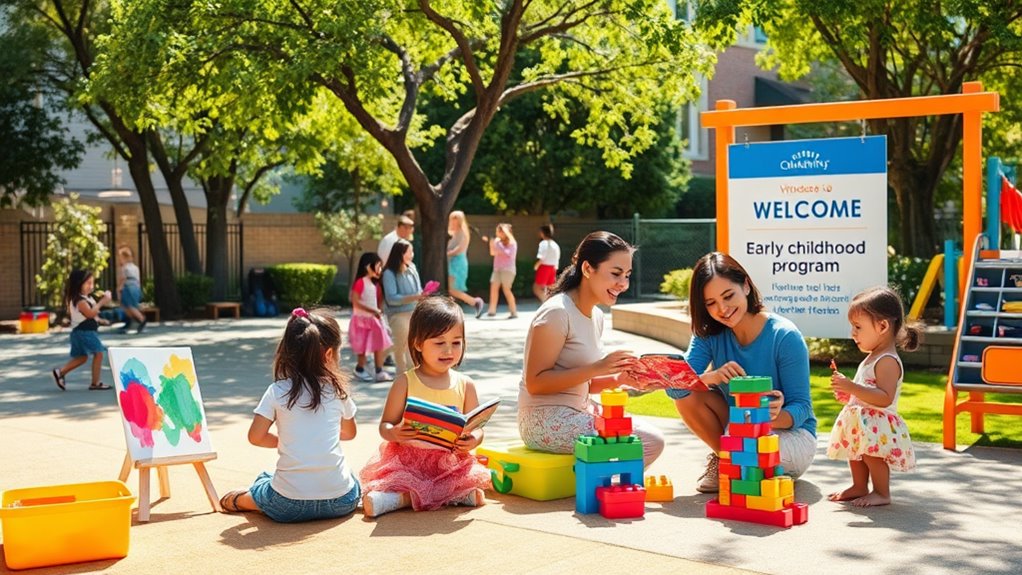How to Spot the Best Early Childhood Programs in Your Area!
To spot the best early childhood programs in your area, assess key factors like teacher qualifications and learning environments. Look for experienced educators with degrees in early childhood and smaller class sizes for personalized attention. A quality program should feature diverse materials and engaging activities that promote both free play and structured learning. Don’t overlook safety measures—secure facilities and trained staff are essential. Lastly, check for accreditation, as this reflects a commitment to high standards. Discovering these elements can guide your choice, and there’s more to uncover to help you make the right decision for your child.
Understanding Early Childhood Education
Early childhood education plays a crucial role in shaping a child’s development and future learning experiences. You might not realize it, but the early years are when kids begin to develop essential skills like communication, problem-solving, and social interactions. This phase of education typically covers children from birth to about eight years old, focusing on holistic growth—cognitive, emotional, social, and physical.
In this crucial stage, children learn through play and exploration, which helps them understand the world around them. You’ll find that effective early childhood programs emphasize hands-on activities that engage children in meaningful ways. They often incorporate games, storytelling, and arts to stimulate creativity and critical thinking.
Recognizing the significance of these formative years can help you appreciate the importance of quality early childhood education. By supporting your child through these experiences, you’re laying the foundation for lifelong learning and success. When you understand the value of early education, you’re better equipped to choose programs that foster a nurturing environment, encouraging curiosity and resilience. This understanding will guide you in spotting the best early childhood programs that meet your child’s unique needs.
Key Indicators of Quality Programs
When evaluating early childhood programs, it’s important to recognize specific indicators that signal quality. Look for programs that prioritize safety, professionalism, and engaging environments for children.
One key indicator is teacher qualifications; experienced educators with early childhood degrees often provide more enriching experiences. Another critical factor is the staff-to-child ratio; smaller groups mean more individualized attention. Lastly, observe the learning environment—spaces filled with diverse materials and activities promote exploration and creativity.
Here’s a quick overview of these indicators:
| Indicator | Description |
|---|---|
| Teacher Qualifications | Educators with early childhood degrees and training. |
| Staff-to-Child Ratio | Lower ratios indicate more personalized attention. |
| Learning Environment | Engaging spaces with a variety of materials and activities. |
Evaluating Curriculum and Learning Approaches
To effectively evaluate early childhood programs, you’ll want to closely examine their curriculum and learning approaches. A strong curriculum fosters a child’s development through engaging activities that promote critical thinking, creativity, and social skills. Look for programs that balance structured activities with opportunities for free play, as both are essential for comprehensive learning.
Here are some key aspects to consider:
-
Developmentally Appropriate Practices: Ensure the curriculum aligns with children’s developmental stages, offering challenges while being achievable.
-
Holistic Learning: Evaluate if the program integrates various subjects like literacy, math, science, and the arts, encouraging a well-rounded education.
-
Child-Centered Methods: Check if the program emphasizes child-led exploration and inquiry, allowing children to pursue their interests and learn at their own pace.
Assessing Teacher Qualifications and Experience
Assessing teacher qualifications and experience is crucial when choosing an early childhood program. You want to ensure that the educators working with your child have the right education and training. Look for teachers who hold degrees in early childhood education or a related field. This educational background provides them with a strong foundation in child development and effective teaching strategies.
Experience also plays a significant role. Ask about how long teachers have been working in early childhood settings. Experienced teachers often have developed essential skills in managing classrooms and engaging young learners. It’s also beneficial to know if they’ve completed ongoing professional development, as this shows their commitment to staying current with best practices in education.
Don’t hesitate to inquire about teacher-to-child ratios. Smaller ratios often indicate that teachers can give more individual attention to each child, fostering a better learning environment. Finally, observe how teachers interact with children during visits. Positive, nurturing interactions can signal that the teachers are not only qualified but also genuinely care about the well-being and development of each child. By focusing on these factors, you’ll feel more confident in selecting the best early childhood program for your little one.
Importance of Safety and Accreditation
Safety and accreditation are fundamental pillars in choosing the right early childhood program for your child. You want to ensure that your child’s environment is not only nurturing but also secure. Programs that prioritize safety often have strict protocols in place, ensuring that your child is protected from potential hazards.
Accreditation indicates a program meets high standards, providing you with peace of mind that your child is receiving quality education and care. Look for programs accredited by recognized organizations, as this reflects their commitment to excellence.
Here are a few key factors to consider:
- Safety Protocols: Check for emergency procedures, cleanliness, and secure facilities.
- Staff Training: Ensure staff undergo regular training in safety practices and child development.
- Accrediting Bodies: Find out which organizations accredit the program, and what criteria they use.
Frequently Asked Questions
What Is the Typical Age Range for Children in Early Childhood Programs?
Early childhood programs usually cater to children aged 0 to 8 years. This range includes infants, toddlers, preschoolers, and early grade school kids, ensuring each age group gets tailored experiences for their developmental needs.
How Can I Tell if a Program Is Affordable for My Budget?
To determine if a program fits your budget, compare tuition rates, look for sliding scale options, and inquire about financial aid. Factor in additional costs like supplies or activities to get a complete picture.
Are There Programs Specifically for Children With Special Needs?
Yes, there are programs specifically designed for children with special needs. You should look for inclusive environments, specialized staff, and tailored curricula. These programs often provide essential support to help your child thrive and grow.
What Kind of Parent Involvement Is Encouraged in These Programs?
In many early childhood programs, you’ll find parents encouraged to participate through volunteering, attending events, and engaging in daily activities. This involvement fosters a strong community, enhancing your child’s learning experience and development.
How Do I Find Reviews or Testimonials From Other Parents?
To find reviews or testimonials from other parents, check online parenting forums, social media groups, and local community boards. You can also ask friends or neighbors for their experiences and recommendations about specific programs.





